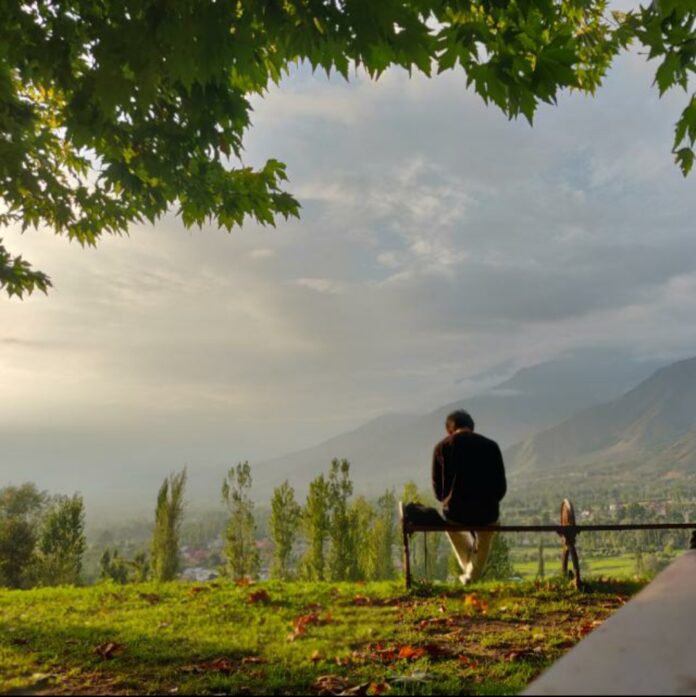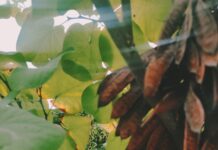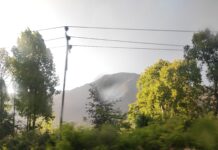Le Dragon Déchaîn (trans. the raging dragon) is the official student publication and radio of Sciences Po, Campus du Havre, Le Havre, France.
Musings of a day in the life of Taif Altaf, a first-year undergraduate at Sciences Po Le Havre, who reflects on his everyday journey, through music, in memory of the soils of his homeland.
Taif Altaf is an alumnus of Delhi Public School, Srinagar. Among other things, he has worked as an editor for GAASH and contributed heavily towards the Oped section. Taif is now attending The Paris Institute of Political Studies, commonly known as Sciences Po, for his undergraduate studies.
Segments of white, glaring light seep past the grey shutters of my apartment. My phone hangs on to its finite battery. Reverberating, it slowly glides past my pillow onto the edge of the bed, crying out all 15 songs I have set as my wake-up greetings. With the guffawing bellows of my fifth consecutive alarm simmering the living soul out of my phone, I am finally awake. Tip tap, Tip tap. Yawns subside as the alarm changes its tone. I stand up only to fall back again; sad efforts of a sleep-deprived student. I crisscross across the cold grey floor, and finally, stop and take a breath at the blank metallic sink. While the grey tap water slithers across its cold metal base, its burbles creating duplicate sounds of turbulence. I am reminded of the streams back home, of the sound of gushing waters across the meadows, of me and my brothers running, falling, and rolling in the dirt. It’s a peculiar kind of homesickness when you start looking for the remnants of your world in the world outside. But the student doesn’t have time to be reminiscent; to take out his phone and gloss through the low-resolution images of home, and everyone he considers home. So he picks up the bag of memories, stuffs it with everything he loves and everyone who loves him, along with his laptop and charger (though sometimes people do forget that), and walks on.
As Faiz Ahmad Faiz said,
“O, wounded heart,
get your things together,
and walk on!”
These are words of wisdom a student like me must hear every morning. For those unfortunate souls with classes at 8:15 am, the first 15 minutes are a delirium. A tussle between the heart’s desire to crash at that table and grades-haunting, pulsating numbers that dictate everything. To add to that, French class at 8:15 means starting your day with words that you cannot pronounce and questions you do not know how to ask. Beyond the monologue of ‘Je m’appelle’ and ‘Je suis’, I desperately try to hold on to the words from a vocabulary that is so close yet seems so distant. I see me and my peers asking questions like children trying to compartmentalize a world that seems ambiguous at first but is full of exceptions. In our efforts to understand the difference between ou and où, I sense joy. In the eyes of a friend whose eyes light up as things start to make sense, in the exclamations of the class as words move from ambiguity to clarity; I see slight glimmers of light seeping through the doors of a culture we strive to experience. At that moment in time, when we feel closer to the people around us, to possibilities and experiences, I imagine us happy. Even if only for a minute, I feel untired. When two hours of a class give one the avenue of belonging in a city where one is merely an outsider, one cannot help but wake up, even if half asleep, and walk on in good faith.
After trying my luck at compartmentalizing the French language, I move towards history, or what is more appropriate to say, I move back in history. In the amphitheater with the capacity of around 150 students, we occupy more than two-thirds of it. Before Mr. Fuller arrives with his coffee, simmering with steam, we line up like Spartans each with a device of his own. As students set up their devices, roll up their sleeves, check the refills of their pens, Mr. Fuller walks towards the podium, swaying his muffler as he moves. Muffled conversations subsume into silence, as the voice from the speakers skims through conversations unknown.
“Hey there.”
While the professor’s words travel- resonating across the amphitheater; waves of experienced fingers echo the thud of keys in return. That is the way one greets in the academia, it’s a symbolic way of saying “Hi, I am listening.” The lecture proceeds from the English salons and tea, to the Ottomans in the East; we are shown similarities. Beyond the facade of who won and who was right, we are shown the ambivalence between the hero and the villain- unsettling the convictions we hold so dearly. In our attempts aimed at understanding the world behind us, we find firmer grounds to contextualize the present in ways more intellectually empathetic to those who think differently. While I disagree on a certain interpretation of a historical event, I know that my peer ten benches left to me thinks differently. But while we disagree on the interpretation of history, we know the value of the argument at stake. The sincerity of it burning in our eyes. The past is what we are willing to see. Choosing between what to memorize and what to forget, we decide who shall be undermined and who glorified; what’s at stake is the choice between his story and mine coalesced as the sum total of centuries bygone. It is in that moment of time, in that state of being that history comes to life; from the dusted panels of libraries it springs out. It possesses and controls those willing to read it. It is here I realize that I, like the many students around me, have come here to present history; and make others walk a mile in our shoes.
You never really leave a class here. With the debate in history still burning in our temples, lunch seems like a daze. The debate continued inside my head, though this time, I hear only what I want to hear, and all others were predictable. Maybe this is what it’s all about, to move beyond the monologue inside one’s head towards that which questions; ambiguous, uncertain and conscious of its own limits.
The red of the Le Havre sky has slowly dried into the night. It’s raining again. We run smeared with water splashed across our clothes. For the reading group at 8 pm, students come in intervals. Each more drenched, sorrier than the previous. Before we start a debate, we try getting ourselves together, a coat needs a good splash, someone needs a comb. While the rain taints the windows with flickering beads of water, the tutor starts the conversation. It’s like the work of a sculptor; it starts slowly, by setting the solid base of definitions before we move towards complex craftsmanship. While he tries to mold something comprehensive out of our raw opinions, we see the shape–slowly emerging from the raw materials. We start formulating our own visions of how to interpret it. In our belief in what we deem to be right, we collide, we clash and fight until we create consensus out of the plethora of opinions we store. In this classroom resonating with shouts, where eyes are fiery and fists are raised, (only as a means of emphasis) I feel blessed. To realize that the girl next to me and I, starkly different in terms of culture, opportunities, and aspirations, can agree on a shared idea of how to shape the world, is truly comforting. It is comforting because somewhere within the depths of this debate lies my future and the future of those I hold dear. Within this debate about concepts of justice, democracy, and human rights, lie the fates of the men and women I used to pass by on the streets. It is comforting because, within this debate, where individuals collide, clash, and cooperate, I am convinced that the future is in good hands, that those who make decisions are willing to bear the brunt of their arguments.
The day delves into the night, as drops trickle down the cold glass windows. I am back at my apartment, listening to Nina Simone’s “Who knows where the time goes.” I skim through my bag and take out the memories I had stuffed within it.
And I am not alone while my love is near me.
I know it will be so until it’s time to go.
So come the storms of winter and then the birds in spring again.
I have no fear of time,
For who knows how my love grows?
And who knows where the time goes?
It is the month of spring in Kashmir. I am running with my siblings and the light damp breeze glides past us. We laugh and smile with joy radiating in our eyes. Meanwhile, the song merges into sleep, my memories swim into dreams and my bag slides down the bed, to be picked up again, tomorrow, and for the many days to come.
Taif Altaf (Almunus)





